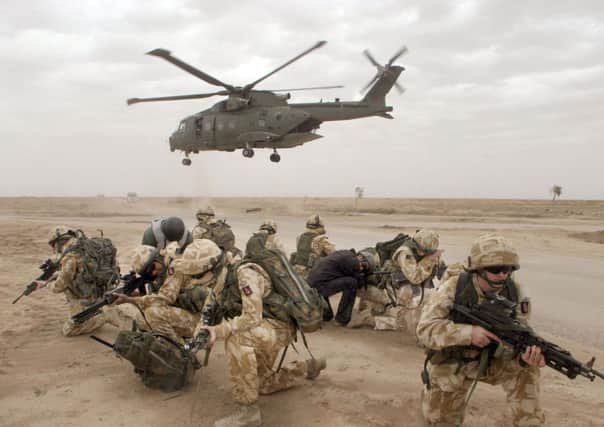Time to reassess defence priorities


Despite the withdrawal of American and British troops from Afghanistan later this year, it would be very foolish to imagine that the rest of the 21st century is going to be tranquil.
It is a truism that the best way to avoid war is to prepare for it. Unfortunately, recent cuts to Britain’s military establishment have gone too far and actually reduced our defence capabilities below the threshold necessary for deterrence. This is the warning contained in a new report from the Commons defence select committee – which contains a majority of pro-government MPs. It is a warning the government must take heed of, especially in the light of the events in Ukraine.
Advertisement
Hide AdAdvertisement
Hide AdFollowing the 2010 general election, the new coalition government decided to slash the size of the British Army by 20,000 regulars and replace them with 30,000 part-time reservists. Criticisms were made at the time that the downsizing of the army’s strength to its lowest since the First World War was a gamble driven more by the Treasury’s desire to save money than genuine security imperatives. It is a gamble that has failed. According to the defence select committee, recruitment of new reservists is falling far below target. Even if numbers are achieved, it will leave the army lacking in professional skills for some time. Britain is increasingly vulnerable.
The idea of increasing reliance on trained reservists is, in principal, a good one. It combines cost-effectiveness with flexibility. It is a route being followed by our Nato allies, including the United States. But even in America, doubts are being expressed regarding reductions in overall military numbers. The Obama administration has explicitly abandoned America’s traditional commitment to being able to fight two wars simultaneously – a move that might explain the recent boldness of Moscow and Beijing to extend their regional spheres of influence.
Of course, stealth fighters and smart technology are important in modern warfare, but in the end peace is always secured by putting boots on the ground. For decades the management of Britain’s defence procurement has been a standing joke, though sadly one that has wasted billions of pounds of taxpayers’ money while leaving our ground combat troops poorly equipped. Our troops should not be made to carry the can for the Ministry of Defence’s ncompetence.
The reduction in British Army numbers has now reached a dangerous tipping point. It is time for the government to readdress defence priorities in the light of both the international situation and the problems in recruiting reservists.
Revolutionary leader
POPE Francis, the first Latin American to lead the world’s 1.2 billion Catholics, has been in office barely a year. Yet in that short time he has attained the status – and media attention – of a “superstar”. As befits the former nightclub bouncer who practices the humility of St Francis of Assisi, the Pope says he finds this personality cult “offensive”. Some of the publicity surrounding him certainly is vulgar and opportunist. Witness the launch of a weekly gossip magazine called My Pope by Silvio Berlusconi’s publishing empire. Even the Vatican is marking the anniversary of Francis’s election with a DVD.
Yet the excitement aroused by the new Pope has genuine roots. We live in a world where politicians are bland by choice and where the public is growing ever more disillusioned with the ability of the democratic process to initiate change. Into this leadership vacuum has sprung Pope Francis, preaching the need for a “church which is poor and for the poor”. This is just as revolutionary a doctrine as when Jesus first preached it 2,000 years ago. And Pope Francis appears to mean what he says, resulting in criticism and opposition from the conservative wing of the Vatican hierarchy.
Francis may be deeply embarrassed by the adulation that he has provoked among Catholics and non-Catholics alike. But there is a yearning for leadership in the world and leaders who have values and – more importantly – demonstrate a commitment to living by them are rare indeed. The fact that one leader so stands out for sticking to the values espoused is perhaps a sad reflection of the expectations the people of the world have come to hold of their leaders.